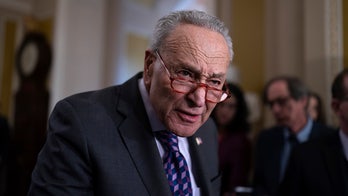Head of NSA warns of cybersecurity threats from China
Fox News correspondent Rich Edson has the latest on US relations with China on 'Special Report'
White House press secretary Jen Psaki on Monday would not comment on reports that China tested a nuclear-capable hypersonic missile, but instead said the United States welcomes "stiff competition," while maintaining that the Biden administration does "not want that competition to veer into conflict."
Reports over the weekend surfaced that China launched a missile in August, which then circled the globe before speeding towards its target, which it missed by about two-dozen miles. The move reportedly caught U.S. intelligence officials by surprise.
When asked about those reports Monday during the White House press briefing, Psaki pointed to Defense Secretary Lloyd Austin's comments on the matter earlier in the day.
"I know general, Secretary Austin, I should say, was asked this question this morning and addressed it," Psaki said. "I'm not going to comment on this specific report."
"I can say, and echo what he said, which is, generally speaking, we have made clear our concern about the military capabilities that the PRC continues to pursue, and we've been consistent in our approach with China," Psaki said.
"We welcome stiff competition, but we do not want that competition to veer into conflict, and that is certainly what we convey privately as well," she added.
CHINESE NUCLEAR-CAPABLE HYPERSONIC MISSILE TEST SURPRISES US INTELLIGENCE: REPORT
Earlier in the day, Austin said he wouldn't comment on the specific reports, but said: "We watch closely China’s development of armaments and advanced capabilities and systems that will only increase tensions in the region."
China said Monday its launch of a new spacecraft was merely a test to see whether the vehicle could be re-used, according to the Associated Press.
Foreign Ministry spokesperson Zhao Lijian said the launch involved a spacecraft rather than a missile and was of "great significance for reducing the use-cost of spacecraft and could provide a convenient and affordable way to make a round trip for mankind’s peaceful use of space."
China’s space program is run by its military and is closely tied to its agenda of building hypersonic missiles and other technologies that could alter the balance of power with the United States.
"China will work together with other countries in the world for the peaceful use of space and the benefit of mankind," Zhao said.
The Biden administration has warned about the Chinese government's "increasingly adversarial" actions, with CIA Director William Burns warning that Beijing poses "the most important geopolitical threat" to the United States in the 21st century.
The CIA, earlier this month, announced the formation of the China Mission Center to counter China.
Burns said the China Mission Center (CMC) will address the challenges posed by the People’s Republic of China and emphasized that "the threat is from the Chinese government, not its people."
Burns said the new mission center will bring "a whole-of-Agency response" and will "unify the exceptional work CIA is already doing against the key rival."
The announcement comes as the Biden administration has warned that China is the "only competitor" potentially capable of mounting a "challenge" to the international system.
President Biden, last month, spoke by phone with Chinese President Xi Jinping for the second time. The White House said the president "made clear" that the discussion was "part of the United States’ ongoing effort to responsibly manage the competition between the United States and the PRC."
"President Biden underscored the United States’ enduring interest in peace, stability, and prosperity in the Indo-Pacific and the world and the two leaders discussed the responsibility of both nations to ensure competition does not veer into conflict," the White House said after the meeting.
The White House in March released new national security guidance, which warned of the "reality" that China "has rapidly become more assertive" and is capable of "combining its economic, diplomatic, military and technological power to mount a sustained challenge to a stable and open international system."
The guidance further warned that China’s leaders "seek unfair advantages, behave aggressively and coercively, and undermine the rules and values at the heart of an open and stable international system."






